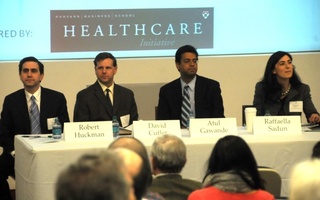
As global health gains popularity, the School of Public Health offers College students many courses but no concentration.
In 2010, University President Drew G. Faust promoted the Harvard Global Health Institute to the status of a permanent institute, declaring that improving the state of global health education on campus was one of her highest priorities. Ever since, Harvard has continued its efforts to respond to a quickly growing interest in global health.
“At that time at least, all the global health courses were General Education courses,” said former Dean of the Harvard School of Public Health Barry R. Bloom and co-instructor of Life Sciences 120: “Global Health Threats.”
According to Bloom, LS120 is one of the few full courses in global health that has prerequisites. It was created specifically to provide a comprehensive class that went beyond general education.
“For students who were majoring in science—that have a real interest in science—there wasn’t that much in the advanced realm in global health for which students were really excited,” he added.
With growing undergraduate interest in global health in recent years, the Harvard School of Public Health has provided support to the Faculty of Arts and Sciences by offering more courses taught by HSPH faculty for undergraduates, establishing a unique relationship between the College and one of its graduate schools.
MEETING AN INCREASED DEMAND
Christopher P. Duggan, an associate professor in the department of nutrition at HSPH, spoke of a similar need to introduce more global health courses to meet the increased demand from undergraduates.
“We felt there was an unmet need and certainly a high interest among the undergraduate students to learn about the concepts of nutrition and how that relates to global health,” said Duggan, professor of Science of Living Systems 19: “Nutrition and Public Health,” about his own course.
Duggan’s course, which was first offered in 2010, saw its enrollment increase by more than 70 percent between its first and second year. It is only one of a number of global health courses that have seen rapid growth.
The School of Public Health is now focusing more of its energy on the College to meet this increased undergraduate demand for such coursework, offering more global health-related courses as the topic continues to grow in popularity across the country. Harvard’s expansive resources across the University have helped it match this demand.
“Lots of schools just don’t have the capacity to meet that interest,” said David M. Cutler ’87, the director of graduate and undergraduate education for HGHI.
“Schools that don’t have a medical school or a school of public health...inherently have fewer people to help out the students,” he added. “We have strong professional schools in these areas that help us out and, just in terms of the resources around here, it’s extraordinary.”
However, the increased interaction between HSPH and the College could lead to a draining of graduate resources as more HSPH professors teach in the Faculty of Arts and Sciences. Duggan acknowledged that the effort required to teach a course is “not insignificant,” but he said that he does not consider the process to be detrimental to graduate studies.
Many faculty work with undergraduate students, according to Cutler, who describes this cross-school pollination as “one of the most transformative experiences in our students’ lives, when they work with a whole host of faculty.”
Though faculty may now be working with students at both the graduate and undergraduate level, Cutler believes that this splitting of resources is not novel. Figuring out how to accommodate the interest of masters students, undergraduates, and researchers in addition to dealing with the physical and technical difficulties of these interactions are just “structural issues that the University has to deal with.”
Read more in News
Harvard Square Reacts to Dramatic Renovation ProposalRecommended Articles
-
The Depths of WintourAmong the capricious fashion cognoscenti, tastemakers can command respect and recognition for half a season or half a century. The
-
How ’Bout Them DemsThis legislation puts America on track to solve these pressing issues by insuring 32 million people and enacting consumer protections that will counter the host of problems plaguing the system.
-
Global Health Focus Grows at HarvardFrom working on frog leg regeneration in Chile, to examining water project pilot protocols in the Dominican Republic, to studying rural Chinese medicine, Harvard undergraduates interested in global health issues are devising their own ways to delve into the field—even in the absence of an institutionalized department.
-
HSPH Students Gather to Hear UN GoalsStudents from across Harvard’s schools gathered Monday morning at the School of Public Health to attend a live videocast of the UN’s Millennium Development Goals—which was taking place in New York City—followed by a discussion between faculty and students.
-
HKS Panel Debates NewsA group of foreign correspondents, radio hosts, and museum curators emphasized the importance of global citizenship while also taking the tastes of local audiences into account in two panel discussions at the Harvard Kennedy School yesterday.
-
 Harvard Business School Panelists Examine Health Care Flaws
Harvard Business School Panelists Examine Health Care Flaws













